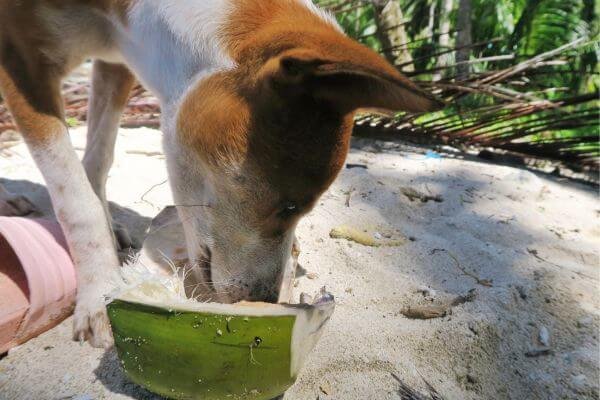Coconuts have long been touted for their health benefits in humans, but it turns out that our canine companions can also reap the rewards of this tropical fruit. In recent years, coconut has become a popular supplement and treat for dogs praised for its ability to improve skin and coat health, boost the immune system, and even support digestive health. In this article, we’ll dive into the world of coconut for dogs, exploring what makes it a canine-friendly option and how to incorporate it safely into their diet.
The Coconut Conundrum: Dog can eat coconut?

Coconut Flesh
Dogs can enjoy fresh coconut flesh in moderation. It’s a source of healthy fats, fiber, and various essential nutrients. Ensure to remove the tough outer husk and offer small, bite-sized pieces of the inner fruit. Fresh coconut can make for a refreshing and chewy treat.
Coconut Water
The clear liquid inside a coconut, often referred to as coconut water, is generally safe for dogs. It’s a hydrating option that provides a natural electrolyte boost. However, be mindful of the sugar content, especially if your dog has dietary restrictions.
Coconut Oil
Coconut oil is a well-known canine superfood. It’s packed with medium-chain triglycerides (MCTs), which can contribute to a glossy coat, improved digestion, and potential immune system support. Introduce coconut oil gradually into your dog’s diet and monitor their response.
Navigating the Benefits: What Can Coconut Bring to Your Dog’s Bowl?

Healthy Skin and Coat
The MCTs in coconut contribute to a shiny and healthy coat. Whether applied topically or ingested, coconut can help alleviate dry skin and reduce itchiness.
Digestive Support
Coconut’s fiber content can aid in digestion and promote gut health. It may be beneficial for dogs with sensitive stomachs or irregular bowel movements.
Boosted Immunity
The antimicrobial properties of coconut may offer immune system support. While not a cure-all, incorporating coconut into your dog’s diet can contribute to their overall well-being.
How to Safely Integrate Coconut into Your Dog’s Diet:
1. Start Slowly: Introduce coconut gradually to monitor your dog’s reaction. This is especially important for dogs with sensitive stomachs. Start with small amounts and observe for any signs of digestive upset.
2. Fresh is Best: When offering coconut flesh or coconut water, opt for fresh and natural sources. Avoid sweetened or flavored coconut products, as added sugars can be harmful to dogs.
3. Mind the Portions: While coconut can be a healthy addition, moderation is key. Consider your dog’s size and individual dietary needs when determining the appropriate portion.
4. Coconut Oil Dosage: For coconut oil, a general guideline is 1/4 teaspoon to 1 teaspoon per 10 pounds of body weight. Adjust the dosage based on your dog’s size and response.
How much coconut can I give my dog?
When introducing coconut to your dog’s diet, it’s important to do so gradually and in moderation to avoid digestive upset. Here are some general guidelines to consider:
- Start Small: Begin with a small amount, such as 1/4 teaspoon of coconut oil or a small piece of fresh coconut meat per day for small dogs, and 1 teaspoon for larger dogs. Monitor your dog for any signs of an adverse reaction.
- Gradual Increase: If your dog tolerates the initial amount well, you can slowly increase the quantity over time. A common recommendation for coconut oil is about 1 teaspoon per 10 pounds of body weight per day or about 1 tablespoon per 30 pounds. However, it’s essential to consult with your veterinarian for personalized guidance.
- Monitor Weight: Coconut is high in calories and fat, so it’s important to account for these additional calories within your dog’s daily intake to prevent weight gain.
- Balance the Diet: Ensure that coconut products do not replace a significant portion of your dog’s balanced diet, as they are not a complete source of nutrition.
- Watch for Digestive Issues: Some dogs may experience loose stools, diarrhea, or other digestive issues if they consume too much coconut. If you notice any of these symptoms, reduce the amount or discontinue use.
- Consult Your Vet: Before adding coconut or coconut oil to your dog’s diet, especially if your dog has a pre-existing health condition or is on medication, consult with your veterinarian.
Remember, every dog is different, and what works for one may not be suitable for another. Always observe your dog closely when introducing any new food to their diet.
Is it safe to give dogs coconut shells?
No, it is not safe to give dogs coconut shells. Coconut shells are hard and can be very tough to chew. Pieces of the shell can splinter and pose several risks to dogs, including:
- Choking Hazard: Small pieces of coconut shell can be accidentally swallowed and become lodged in a dog’s throat.
- Intestinal Blockage: Larger pieces might not be properly digested and could cause an obstruction in the gastrointestinal tract, which might require surgical intervention.
- Dental Damage: The hardness of the shell can lead to cracked or broken teeth.
- Internal Injury: Sharp edges from splintered coconut shells can cause damage to the mouth, throat, or internal organs if ingested.
It’s best to keep coconut shells away from dogs and to offer them only safe, dog-appropriate chew toys or treats. If your dog accidentally ingests coconut shell pieces, monitor them closely for any signs of distress and consult with a veterinarian immediately.
Conclusion: Dog Can Eat Coconut

In conclusion, coconut can be a delightful and nutritious addition to your dog’s diet when offered in moderation and suitable forms. From the hydrating benefits of coconut water to the potential perks of coconut oil, this tropical treat brings a touch of the exotic to your canine companion’s culinary experience. As always, consult with your veterinarian before introducing new foods into your dog’s diet, especially if they have existing health conditions or dietary restrictions. With a mindful approach, you can treat your furry friend to the wholesome goodness of coconut, enhancing both their palate and well-being.

